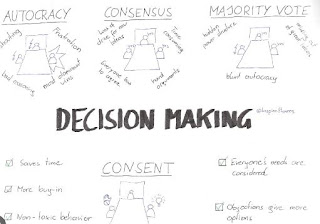The Relationship Between Organizational Culture and Authority
The Relationship Between Organizational Culture and Authority
Mahmutovic. J (2023)
Organizational culture and authority have a nuanced and intricate relationship. The common attitudes, practices, and values that influence how people interact and collaborate inside an organization are referred to as its organizational culture. Conversely, authority refers to the capability or prerogative to issue directives, render judgments, and compel adherence within an establishment.
What are Edgar Schein's Two Organizational Cultures?
Power Distribution
Centralized vs. Decentralized Authority
The degree of authority centralization or decentralization varies throughout organizational cultures. A culture that emphasizes empowerment and creativity may be more decentralized than one that prioritizes hierarchy and tradition, which may lead to a more centralized authority structure.
Leadership Style
Authoritarian vs. Participative Leadership
Leadership styles within an organization can be influenced by its prevailing culture. A top-down approach to power, in which decisions are made at the highest levels of management, may be fostered by an authoritarian culture. On the other hand, a participative culture might promote distributed authority and joint decision-making.
|
|
participative leadership style
|
authoritative leadership style
|
Pros
|
Promotes
teamwork, creativity and self-development
|
An efficient
way of working
|
|
|
Employees’ right to have a say |
Clear hierarchy |
Cons
|
Lengthy decision-making processes |
Low creativity |
|
|
Internal tensions and conflicts |
Low motivation |
Communication Patterns
Formal vs. Informal Communication
Communication patterns are shaped by organizational cultures, and these patterns affect the way authority is communicated. Formality-focused cultures tend to be more structured and formal in their communication, whereas informality-focused cultures tend to be more open and fluid.
Decision-Making Processes:
Consensual vs. Autocratic Decision Making
The process of exercising authority is influenced by the cultural norms around decision-making. While decision-making authority may be shared by several parties in a consensual culture, it may be concentrated in the hands of a small number of people in an authoritarian culture.
Employee Empowerment
Empowerment vs. Control
Certain company cultures place a high value on giving workers more freedom and control in their positions. Others would place more emphasis on maintaining order and following protocols, which would restrict personal freedom.
Cultural Values:
Values Alignment with Authority
An organization's ingrained cultural beliefs might affect how power is viewed and accepted. There is probably going to be more acceptance and loyalty to authority structures when corporate ideals are in line with the use of authority.
Change Management
Adaptability and Authority
An approach to power structures that is more flexible may be necessary in a culture that emphasizes adaptation and change. A more traditional and stable culture, on the other hand, can be resistant to modifications to the established hierarchies.
Conclusion
It is essential for managers and leaders to comprehend the connection between authority and organizational culture in order to establish a work environment that supports the mission and core values of the company. It additionally facilitates the development of a constructive and fruitful corporate culture that backs efficient decision-making and teamwork.






Yes, you are right. There is an important correlation and both are intertwined. In an organization, authority is a hierarchy structure that determines the behaviors, attitudes, dispositions and ethics that create the work culture. If an organization is structured it forms decision-making power is centralized at the top and company's culture lack freedom and autonomy at lower levels. If the organization is decentralized, it forms a participatory style what you have told where power and authority are shared and the culture is more independent, personalized and accountable (Masters, 2023).
ReplyDeleteReference:
Masters, T. (2023) 'What is the Relationship between Organizational Structure and Organizational Culture?', SmartCapitalMind, 22 November. Available at: https://www.smartcapitalmind.com/what-is-the-relationship-between-organizational-structure-and-organizational-culture.htm#:~:text=If%20a%20company%27s%20management%20structure%20is%20decentralized%2C%20with,allocates%20power%20and%20authority%20determines%20how%20employees%20behave. (Accessed: 16 December 2023).
Organizational culture is the set of values, beliefs, attitudes, systems, and rules that outline and influence employee behavior within an organization. The culture of an organization can have a significant impact on the behavior of its employees. Culture can increase productivity, job satisfaction, and innovation, while a negative culture can lead to high turnover rates and low morale. Organizational culture and authority have a nuanced and intricate relationship. I agree with your statement. Authority refers to someone's duties and the imposition of certain rules and regulations. Authority is very important for the smooth functioning of the organization. Further, do you know Organizational authority is classified into three categories. 1) Line authority – This gives power to a superior to make decisions and order their subordinates. 2) Staff authority - The people who are responsible for improving the employees' efficiency have staff authority. 3) Functional authority - delegated to certain staff personnel as per their function.
ReplyDeleteThe relationship between organizational culture and authority is a crucial thing to look and many valid points were included in your article which could be reflected in an HR background.
ReplyDeleteAgree with you. great understanding on organizational culture in bought through this article. values in the system of an organization should be effectively conveyed to the employees in order to make sure the organizational culture comes in lime with the culture of the employee which affect the belief and attitude expressed by the employees.
ReplyDeleteMost companies in the contemporary world should rely largely on the participative style of leadership as a means of encouraging inclusion and enhanced creativity. While i feel authoritative leadership styles allows a controlled organization culture, the participative style encourages an engaged organization culture. Therefore your take on the two styles and how the organization's culture reacts to each is indeed interesting.
ReplyDeleteWhen discussing about organizational culture, it directly refers to the existed and existing beliefs and values in an organization for a long period of time. That culture influences the attitudes and behavior of the personnel of the organization. Therefore, it is crucial to realize the relationship between organizational culture and job satisfaction of employees. The core values of a company starts with its leadership, which will then progress to a leadership style (Tsai, 2011).
ReplyDeleteWell broken down showing the comparison between a centralized and decentralized authority, and I totally agree that this has to be tied up with the Company culture. I have clearly seen the difference on how the leadership approach affects the culture.
ReplyDeleteGreat article, culture of an organization will be depend upon the style of leadership. In my personal experience I have worked with authoritative and participative working environment, authoritative working cultures are very hard to perform, low recognition, and High level of turnover, meantime participative environment will break all those barriers and let the employees feel and enjoy working in an environment
ReplyDeleteGood article! The relationship between authority and organizational culture plays a crucial role in determining the culture and leadership structure of a business. A harmonious connection promotes a cohesive workplace, which accelerates organizational performance by enabling employees to make wise decisions and take ownership of their job.
ReplyDeleteTrue Reza. Organizational culture deeply influences how authority is perceived and exercised within a company. A culture that values open communication and collaboration often promotes a more participative and inclusive approach to authority, where decisions may be decentralized. On the other hand, hierarchical cultures tend to emphasize clear chains of command and centralized authority structures. Understanding this relationship helps shape how authority is distributed, communicated, and respected throughout the organization.
ReplyDeleteAs you have stated Reza, building an environment at work that upholds the company's mission and core values requires managers and leaders to understand the relationship between responsibility and organizational culture
ReplyDeleteThanks Reza! Pretty much competence content. However, I believe. It is difficult to build relationships in bureaucracy-based organizations since employees are not welcome to confront their opinions and opinions are not valued.
ReplyDelete